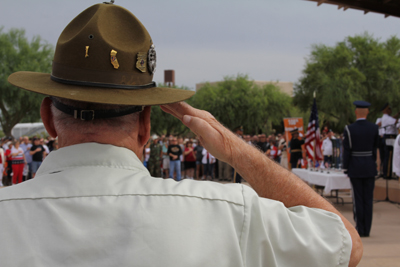By Chad Garland, News21

A veteran salutes during the posting of the colors National Memorial Cemetery of Arizona. (Photo by Chad Garland, News21)
If you’ve met one veteran, you’ve met one veteran.
This seemingly simple message was an Army veteran’s refrain to a room full of reporters in Arlington Heights, Ill., May 10.
Erica Borggren, who served in Iraq as an Army officer in 2008, is director of the Illinois Department of Veterans’ Affairs. Reporters had gathered for a seminar about covering post-9/11 veterans, but several acknowledged they didn’t know a single veteran or where to find one.
I was there as a News21 Fellow, but I am also a veteran. Until August 2012, I was one of roughly 76,000 post-9/11 veterans living in Illinois. I never served in Iraq or Afghanistan, but I faced many of the obstacles that war vets face — finding my place in a community, pursuing a career, completing higher education, and navigating the labyrinthine U.S. Department of Veterans Affairs.
At the University of Illinois, I was often the one veteran whom student reporters knew how to find, probably because of my duties as president of the Student Veterans of America chapter. I fielded calls or emails, but I was disappointed often by the repetitive, “I’d like to talk to a veteran who’s having problems.”
Yes, veterans have problems. I know a guy who got blackout drunk at least once a week to shut out recurring memories of his experiences at war. Another sometimes awakes in the night and forgets whether he’s home or still in Iraq.
I know a Marine who suffers acute bouts of anxiety and smashed his laptop against a wall out of frustration with schoolwork. But he also intervened when several drunks harassed a bus driver. He defused that situation without violence.
Certainly veterans across the spectrum of service experience can use a hand. In my reporting role at News21, I’ll delve into the work done by veteran support organizations and nonprofits to aid these men and women.
Veterans like my fellow Marine defy the stereotypes of damaged individuals. All, though, face varying forms of judgment.
A Navy veteran, married with two young children, earned a degree in engineering physics at one of the top schools in the country. When he was interviewing with potential employers, a recruiter told him not to mention military experience; it was a liability.
Another Marine veteran, orphaned at 6, was raised by his oldest sister on Chicago’s Southside. He went to Illinois to study electrical engineering so he can develop the technology he wished he’d had as an infantryman in Iraq.
I know a dozen more veterans who are responding to the needs in their communities by getting involved in education, politics, social work, medicine, research, law enforcement and several other fields.
I got into journalism in part because I saw the need to tell the overlooked stories of these veterans and others. I didn’t expect I’d become part of the News21 national investigation into problems that veterans face and telling their unique stories, but I can’t imagine a more timely and important topic.
I’m looking to turn my experience into an asset, not a liability. But I’m just one veteran — there are millions of us across the country.
